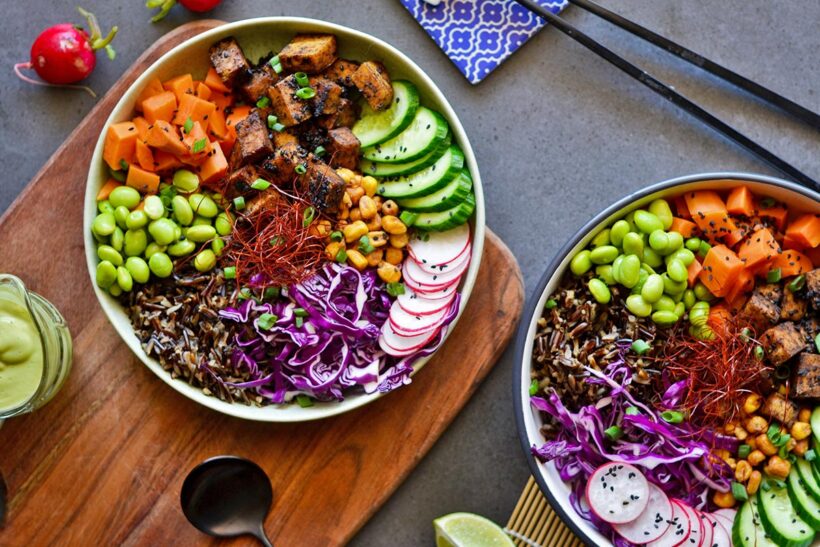Veganism: Plant-Based Eating Pattern

The popularity of veganism continues to rise as many people are switching to a plant-based diet for health and environmental reasons. However, many are still unsure about veganism. Here, we will discuss what veganism is, the myths surrounding it, and its benefits.
Understanding Vegan Food
Veganism is a lifestyle that excludes all animal products. Unlike a vegetarian diet, which may still include animal products like eggs and dairy, veganism does not include any animal products whatsoever. This means no eggs, milk, meat, or even gelatin. By abstaining from these products, vegans aim to reduce their impact on animal welfare and the environment while improving human health.
Core Principles of Vegan Food
The core principle lies in the use of plant-based ingredients. Being vegan is more than just consuming grains, vegetables, fruits, and the like. By focusing on healthy plant-based foods, you prepare yourself to reap many benefits from plant-based foods.
Vegan food is naturally rich in minerals, vitamins, and fiber, which are beneficial for preventing various health issues like heart disease, cancer, and diabetes. Many people adopt veganism out of concern for the planet and for cost savings.
It’s hard to ignore the impact of animal farming on the environment, such as greenhouse gas emissions and deforestation.
See also : Simple Recipe for Mexican Street Food
Benefits of Consuming Vegan Food
Vegan food provides many benefits, not only for individual health but also for the planet. It’s healthier because it usually has less bad stuff like fats and cholesterol. Instead, it’s full of good things like vitamins and fiber that keep you healthy.
And when we choose plant-based foods, we’re also helping our planet. Making vegan food takes less water, land, and energy compared to raising animals for meat. Plus, it helps cut down on the pollution that harms our Earth. So, by eating vegan, we’re not only keeping ourselves healthy but also doing our part to take care of the environment for the future.
- Health: When done correctly, a vegan diet provides a wealth of nutrients like vitamins, fiber, and antioxidants. This not only improves overall health but also reduces the risk of chronic diseases like diabetes, heart disease, and cancer.
- Sustainability: Vegan diets tend to be more environmentally friendly than diets containing dairy and meat. This is because vegan diets require less energy and water resources and produce fewer greenhouse gas emissions.
- Animal Welfare: Choosing to consume vegan food eliminates support for farming practices that involve exploitation and potential cruelty to animals.
- Food Innovation: Adopting a vegan diet can spur culinary creativity by encouraging the exploration of various plant-based ingredients and cooking techniques. This opens the door to creating various dairy and meat alternatives.
Debunking Vegan Food Myths
Dispelling myths about vegan food is important because veganism is often misunderstood.
1. Lack of Protein
This is a common misconception. While meat is a protein source, many plant-based foods also contain protein. Foods like quinoa, tofu, beans, and lentils are excellent protein sources. There are plenty of high-protein vegan foods available, and a well-planned vegan diet can easily meet protein needs.
2. Calcium Deficiency
This myth arises from the belief that dairy products are the only source of calcium. However, many vegan products are rich in calcium, including plant-based milk and green vegetables like broccoli, kale, and grains.
3. Always Healthy
While a vegan diet can be very healthy, it’s not automatically so. Like any other diet, a vegan diet needs to be balanced and varied to ensure adequate nutrition.
4. Boring Food
This myth is far from the truth because there are plenty of options for grains, vegetables, fruits, and nuts that make vegan diets interesting and diverse. Additionally, there are many innovative vegan products available now.
5. Expensive
While some specialty vegan products can be expensive, staple foods like beans, grains, vegetables, and fruits are economical options. Moreover, with the growing popularity of veganism, more affordable vegan products are becoming available in the market.
Various Vegan Food Creations
As mentioned earlier, vegan food options are abundant nowadays, making plant-based eating not only delicious but also diverse.
1. Meatless Meatball Sandwich
Make meatballs by mixing eggplant and mushrooms and serve them on whole wheat bread. This sandwich is aromatic and will surely surprise anyone who cooks it, as it contains no meat.
See also : Healthy Food Ingredients for Busy Days
2. Lentil Soup
Add vegetables like sweet potatoes, scallions, and kale to a pot. The abundance of liquid in it will be very filling and nutrient-rich. If you’re fully vegan, you can skip the use of parmesan.
3. Cauliflower Alfredo Fettuccine
The main ingredients of alfredo sauce are heavy cream and cheese. However, a vegan version can be made using cauliflower sauce, which is healthier. You can combine cauliflower with coconut milk and yeast to create a creamy and dairy-free sauce. To make it more appealing, add parsley and lemon zest.
4. Broccoli Pesto Pasta
This flavorful pesto is made using roasted broccoli (stalks and florets), salt, olive oil, arugula, lemon juice, lemon zest, almonds, and pepper. Although pesto requires cheese, you can replace it with nutritional yeast, which is vegan-friendly.
5. Eggplant Curry
Eggplant’s meat-like texture makes it an ideal ingredient in vegan and vegetarian dishes. Add green beans to increase protein and curry powder for flavor. To ensure this dish is fully vegan, use plant-based yogurt instead of cow’s milk yogurt.
So when asked, “What is vegan food or veganism?” You can easily answer. Veganism is a lifestyle that prioritizes plant-based ingredients and avoids the use of animal products for health, ethical, and environmental reasons.
Adopting this lifestyle doesn’t mean limiting flavor or eating patterns. This is because the variety of plant-based ingredients makes this food delicious, diverse, and filling.
So get creative with plant-based foods, as exploring different cooking methods and ingredient variations will make plant-based eating anything but boring. Awareness of this lifestyle encourages people to seek alternative food sources to replace dairy and meat products. In fact, some plant-based dishes taste similar to meat or chicken. So, are you interested on becoming vegan? Or you prefer just stay the same?


